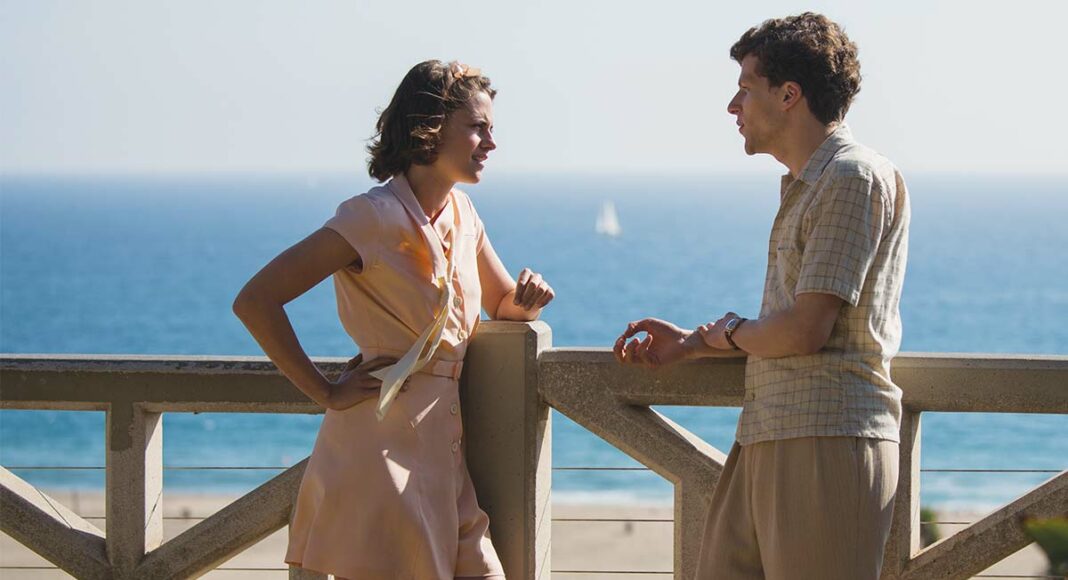If Blue Jasmine was Woody Allen’s homage to A Streetcar Named Desire, then his latest, Café Society, evokes Casablanca, both in tone and romanticism. True, Allen’s film is set in the 1930s, not the ’40s; it takes place in Hollywood and New York City, not Paris, and there are no Nazis lurking about. But otherwise, this plays like a spiritual prequel to the classic Bogart movie, the kind of bittersweet story of young love that might come back to haunt the participants years later, after they’ve moved on. (It even ends up where Casablanca begins—in a nightclub.)
Beautifully shot by veteran cinematagrapher Vittorio Storaro, at Old Hollywood locations all over Los Angeles (including the Chinese and Los Feliz theaters, and several vintage Bel Air mansions), Café Society revolves around Bobby Dorfman (Jesse Eisenberg). An innocent from one of Allen’s typically large, boisterous Jewish families from the Bronx, Bobby wants more out of life than working in his father’s factory. So his mother Rose (Jeannie Berlin) ships him off to her brother Phil Stern (Steve Carell), a hotshot Hollywood agent.
Uncle Phil is too busy taking calls from movie stars and making deals to even see Bobby for three weeks, but finally hires him as an errand boy, then a script-reader. Phil assigns his personal assistant, Vonnie (Kristen Stewart), to drive Bobby around and show him the town. Beautiful, level-headed Vonnie isn’t interested in the glitz and glamour of showbiz; she’d rather live at the beach and eat tacos in a cozy Mexican joint. Bobby is completely smitten with her, even though she tells him she has a boyfriend.
Meanwhile, back in the Bronx, Bobby’s older brother Ben (Corey Stoll) is rising in the ranks of another business: the Mob. Stoll, so hilarious as Ernest Hemingway in Midnight In Paris, is just as impressive here; while Ben’s dubious activities are presented as comic sight gags, he personifies the darker side of the ’30s—although nobody clinking glasses at the Hollywood pool parties Phil and Bobby frequent seems to have ever heard of Prohibition, let alone the Depression.
The point is, Allen presents a romanticized vision of a 1930s that never was—except in the movies. (The same way Casablanca romanticized the wartime era, Nazis and all. And we know how obsessed Allen is with Casablanca, from Play it Again, Sam, right?) As a confection celebrating old-time Hollywood glamour, Café Society is pretty irresistible. Allen even coaxes warmth and humor out of the often-frosty Stewart, softened here in a wavy, auburn bob.
Eisenberg does what every protagonist in an Allen movie (male or female) has done in the last 15 years or so: channel the youthful Woody. As a young naif in Hollywood, staying at the Ali Baba hotel, Bobby is too nervous to go through with it when he tries to hire a call-girl (a sweet Anna Camp)—especially when he finds out she’s a nice Jewish girl on her very first assignment. He’s a tender-hearted clown prince growing up into a smoothie running Ben’s New York City nightclub.
But as dreamy as the movie looks, the storytelling doesn’t always hold up. Carell plays Phil with such slick, glad-handing verve, we keep expecting him to be exposed as some kind of opportunistic fraud. But, despite some ignoble decisions in his own romantic life, the character doesn’t have that extra dimension of complexity. Ditto Blake Lively as Veronica, a charming New Yorker Bobby meets after he moves back home. Lively is dazzling (Allen always makes his actresses look great), with plenty of panache in her brief scenes, but she disappears from the action almost as soon as she’s introduced, and the film moves on.
But moving on is what Café Society is all about. Allen himself provides voice-over narration, setting the stage and filling in the blanks as the plot skips ahead to its final conclusion. As fresh and youthful as the central love story is, this is the work of a mature sensibility, a wistful meditation on choices made that invites us to ponder what might have been.
CAFÉ SOCIETY
*** (out of four)
With Jesse Eisenberg, Steve Carell, Kristen Stewart, Corey Stoll, and Blake Lively. Written and directed by Woody Allen. A Lionsgate release. Rated PG-13. 98 minutes.














